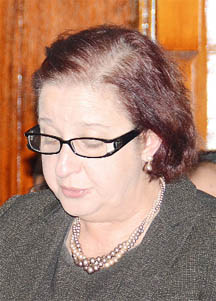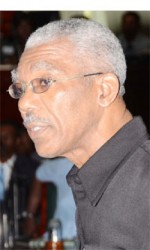Government on Tuesday once again concluded the work of the select committee responsible for the revision of anti-money laundering legislation in the absence of opposition members, setting up a potential clash on the crucial bill when the National Assembly meets next week.
The committee’s report is now being drafted as it prepares to present the bill before the National Assembly next week.
Like in the previous committee last year, PPP/C chairperson Gail Teixeira moved to complete the consideration of the Anti-Money Laundering/Countering the Financing of Terrorism (AML/CFT) (Amendment) Bill in the opposition’s absence.

Opposition representatives had once more said that their attendance at a Tuesday meeting was out of the question since APNU’s shadow Cabinet meeting is held the same day.
However, should government try again to proceed to the National Assembly to force the passage of the bill, it could suffer the same fate it did last year when the combined opposition torpedoed the amendment, saying more work was required. The bill was eventually given new life and re-committed to the current Select Committee.

In a Government Information Agency (GINA) report yesterday, Teixeira was quoted as saying that two APNU representatives indicated that they could not attend Tuesday’s meeting while the rest chose to boycott.
The “boycott” comes on the heels of the opposition’s decision to walk out of a meeting on Monday after the government insisted on having members of the Private Sector Commission (PSC) observe the committee’s proceedings. The walkout was greeted with the PSC’s condemnation on Tuesday.
Teixeira said that in the interest of time, the members of government forged ahead with the committee’s business and examined new submissions that have been received.
“No effort will be spared to meet the February 13th deadline; however, this is not up to the government alone, there is urgent need for the opposition to take a forthright and principled position in the interest of the nation,” Teixeira said.
When contacted yesterday on the matter, APNU and Opposi-tion Leader David Granger told Stabroek News that he was unaware of the government’s decision to bring the scrutiny of the bill to a close.
Granger confirmed that two of APNU’s representative’s on the committee – Jaipaul Sharma and Carl Greenidge – are out of the country and could not attend the meeting, while the other two -Basil Williams and Joseph Harmon – did not attend because they were required to be at coalition’s shadow Cabinet meeting.
Harmon was also unaware of the decision taken on Tuesday. He said the committee had adopted the practice of sending out minutes for each meeting the following day, but when Stabroek News spoke to him last evening he was yet to receive the minutes.
Harmon described the development as unfortunate but said that APNU will be present at a meeting scheduled for this evening to ensure that the report contains the recommendations/ presentations made by stakeholders, including APNU itself.
As was the case last year, he and the APNU are of the belief that much more work is required.
Providing that the bill, as amended at the level of the committee, receives the support of the opposition members of the House during Monday’s planned sitting, Guyana may be seen in a more favourable light when the international watchdog group, the Financial Action Task Force (FATF) meets next week. But if the opposition parties find again that the proposed amendment bill is inadequate, they may again vote against it.
Such a decision might draw some criticism since the opposition, according to the government, is yet to unveil their amendments. This was pointed out by Teixeira, according to GINA. “How can you be telling the country that the Bill needs to be strengthened and more comprehensive and you haven’t’ said, in that committee, what must be done. Clearly this is bullyism and holding the government and the nation to ransom,” Teixeira argued.
Teixeira also spoke of APNU’s threat to withhold support for the bill until President Donald Ramotar gives his assent to several bills he rejected as a result of their “unconstitutionality.” The coalition also wants the government to give effect to several bills that have been passed but not yet implemented.
Despite statements by Granger that APNU wants to work towards having the bill passed before February 12th, Teixeira says that there has been “no indication that they are desirous of concluding this matter.”
Guyana missed two deadlines to pass the AML/CFT (Amend-ment) Bill last year, and while the Caribbean Financial Action Task Force (CFATF) has given the country until May to get the bill passed, it is possible that the FATF will put Guyana under the microscope when it meets next week.
If Guyana is found wanting at this meeting, Teixeira says the country will be placed under prima facie review. “This would be more stringent in terms of the standards and requirements that have to be complied with than that of the preliminary review conducted by the Caribbean Financial Action Task Force (CFATF),” GINA quoted Teixeira as saying.
She also said that Guyana would remain “blacklisted” as it works to meet the requirements, since international financial bodies will be required to take protective actions against Guyana.
After failing to meet the November deadline last year, CFATF advised its members to consider actions to insulate themselves against any money laundering or terrorism financing that may be taking place here.
Even as Teixeira bemoaned the current situation, stakeholders also sought to urge the political parties to get the work done, and fast. In a statement last evening, the Guyana Manufactu-ring and Services Association (GMSA) said “it is now more apparent that our parliamentary parties are continuing to dither in the Select Committee over refining the Anti-Money Laundering/ Countering the Financing of Terrorism (AML/CFT) legislation which is long overdue.”
The body noted that although Guyana has already been blacklisted, further negative effects can be avoided “if only our parliamentarians would work with more alacrity to pass the amended Bill.”
While it urged for haste in the passage of the legislation, the GMSA noted that several agreements which stemmed from the recommendations made by the CFATF to Guyana have not yet been properly instituted-including the Financial Intelligence Unit–and said that stakeholders “are yet to be assured that the non-contentious requirements” have been implemented.
The GMSA pointed out that the CFATF’s Action Plan recommends, aside from the passage of legislation, the implementation of mechanisms aimed at criminalising money laundering and terrorist financing offences, and addressing all the requirements regarding beneficial ownership. “Guyana also has to strengthen its mechanisms for suspicious transaction reporting, for international cooperation, for freezing and confiscating terrorist assets, and fully implementing the United Nations conventions. While some effort has been made to address these deficiencies, the CFATF is not satisfied that Guyana has taken sufficient steps to improve our compliance with the AML/CFT regime,” GMSA chided.
Finally, GMSA reminded the members of the committee that “harsh penalties are in store for Guyana if/when the country is eventually classified by the international task Force as NON-COMPLIANT.”
From all appearances, Guyana will again fail to meet the next CFAFT deadline,” it lamented.
The Private Sector Commis-sion and the Georgetown Cham-ber of Commerce and Industry on Tuesday called on all sides to work towards having the bill passed. The private sector has expressed grave concern about the possible fallout from the blacklisting of Guyana.
(Chevy Devonish)





